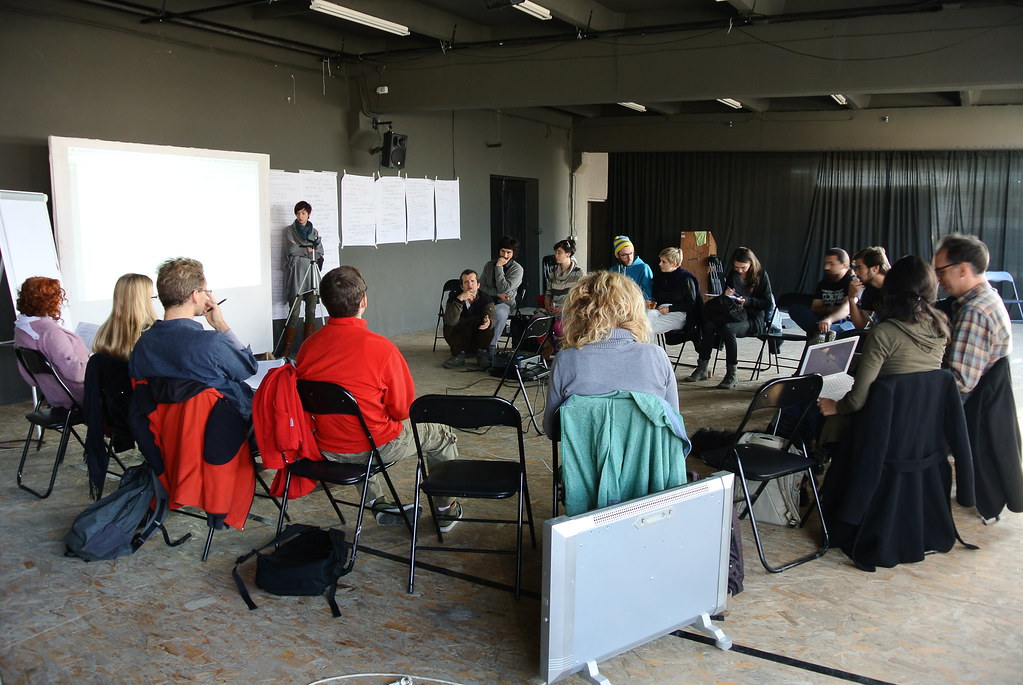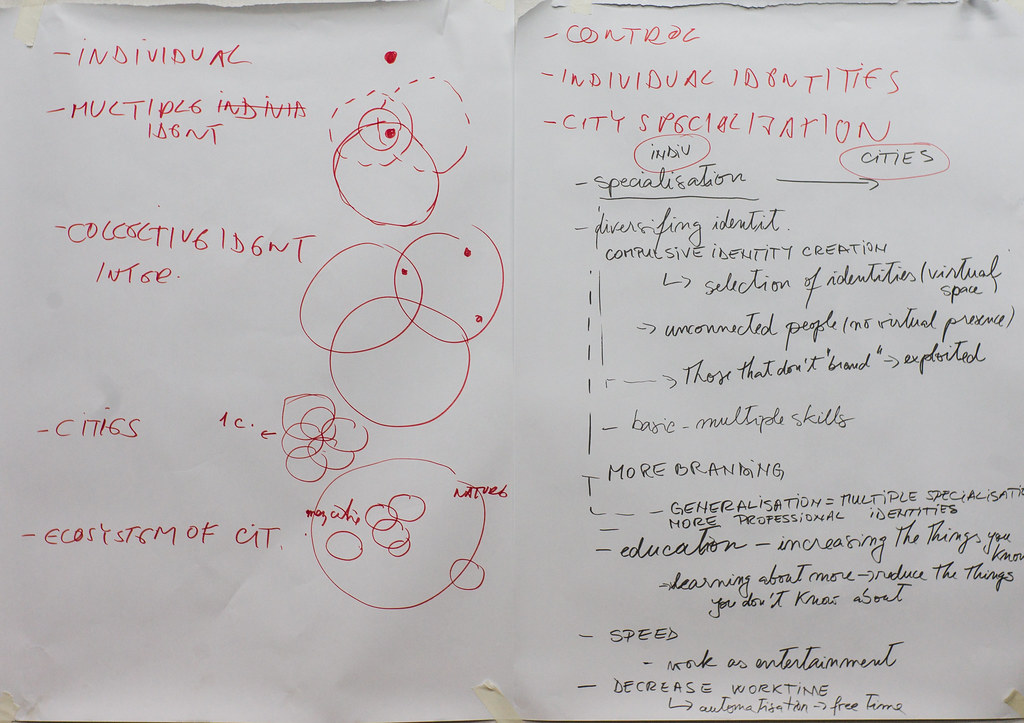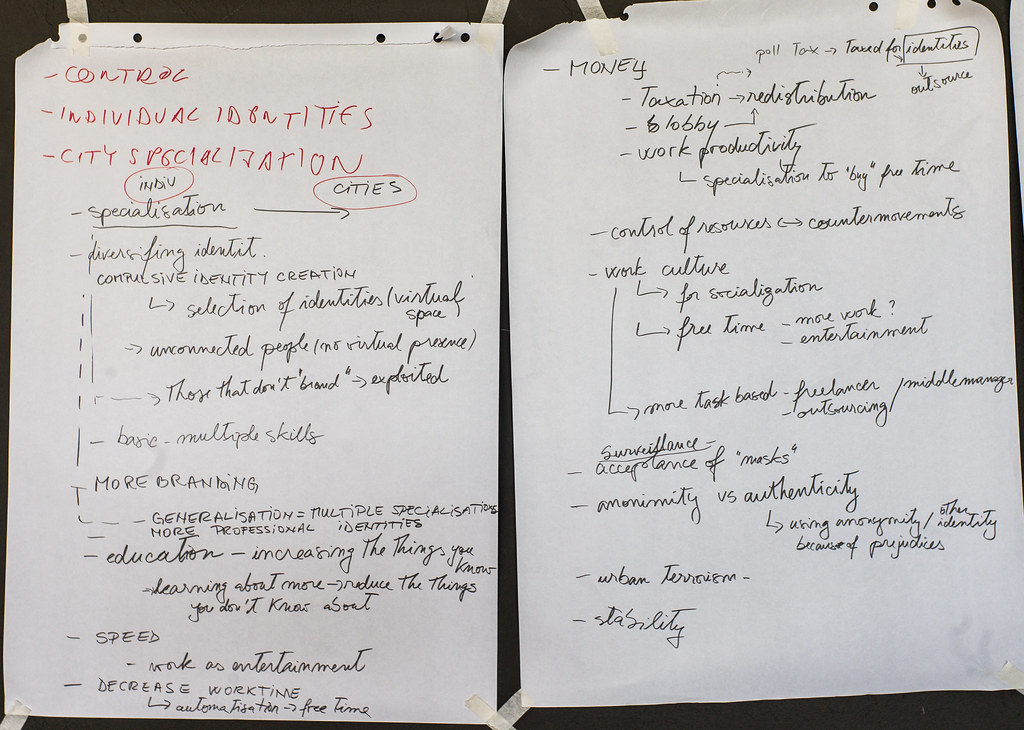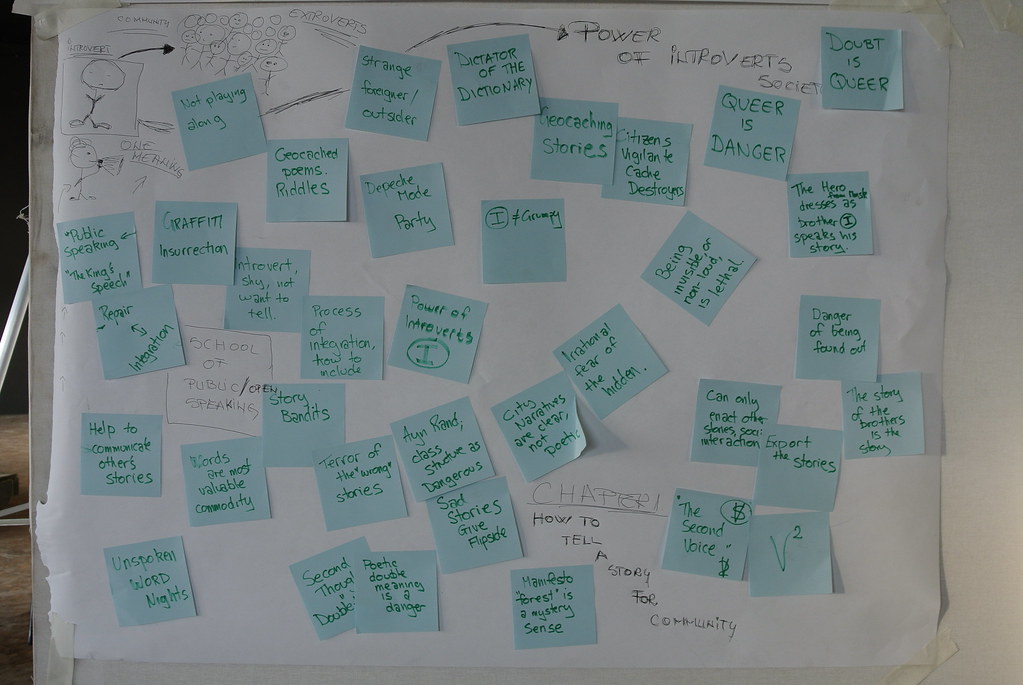Table of Contents
Future Of The City

fabulation session 20131107-8 AltArt, Transylvania. Faciliated by Istvan Szakats
Cities are becoming ever more significant habitats for humans in the future. Envisioning the future of the city can bring forth significant assumptions about our individual and social identity. What kinds of paths can city development take? What kinds of social movements will it encompass? What will be our place in the city we will live in 20 years from now? Who will we be and what we will do?
(notes from day 1)



Group – Rarita
Cities – general ideas
- Most people in Europe live in cities (60%?) – one cannot escape statistics
- Surveillance – recent history (pre-1989) vs traffic surveillance; to be watched (CCTV) vs feeling constantly watched; anonymity in public spaces vs rural “surveillance” where you can’t escape being noticed
- City annihilates or amplifies individuality
- Sectoral industry cities are different from continent to continent / country to country
- Paris as example of homelessness, rats, misery vs tourism mania
- Cities have different orientations (industrial, cultural, touristic)
- The issue of ghost cities, abandoned or failed cities (e.g. Detroit, Chinese cities)
- Pathological behaviors in cities
- Homelessness – high in capital cities, low or non-existent in smaller cities
- One is always a minority and never the target of everything that is going on in a city
- Sustainability – cities are the least sustainable form
- Everything that has to do with cities is a paradox
- Every city holds the potential for a better path to the future
- Rural-urban distinction
Characteristics
- Lots of people
- Crowds
- Special districts for all tastes / hobbies – thematic, food, cultural, for specific groups
- Concentration yet variety
- Cities cluster / marginalize around specific purposes (issue of immigrants, rent price control, parking control)
- Communities that always “flock together”, small communities
- Traffic – too many cars, yet cars define social status and are considered a “must have”
- There is always a chance for leisure activities (running, exercise)
- Biking is increasingly common
- Lots of services
- Geography / landscape defines cities
- Eco-cities and real sustainable cities – can they exist?
- Food – farmers, organic products
Likes – What do we like / love about cities?
- There are communities for everything
- Diverse population
- Safety
- Cities are walkable
- Multicultural / pluralistic
- History
- Multiples, culture crash
- Cities are too big to comprehend easily, inexhaustible
- Concentration of energies
- Anonymity
- Variety
- Cities as culture magnets
- Velocity – speed, access, information, mobility
- Variety of foods / cuisines
- Connectivity, internet and easy access to information
- Freedom and obscurity
- Different cultural backgrounds and different styles
- The chance to make choices
- Regenerative cities: cities can transform and improve themselves
- Urban planners and architects can use challenging concepts to transform cities
- Love a city that still has / preserves a human scale
- Changing realities
- Friendly people
- Interest in marginal groups
Dislikes – What do we dislike / hate about cities?
- Stigmatization
- Racism
- Poor urban planning – historical vs new neighborhoods
- Lack of forests, distance from nature
- Traffic jams
- Claustrophobia
- Dependence on resources
- Concentration of people who never talk to each other
- Social / public spaces that make you feel strange, alienated
- Intolerance
- Getting the chance not to be noticed
- Lack of interest from others about who you are
- Distraction
- Burden of making choices
- Loneliness, isolation
- No place for losers – only for successful people
- The social pressure to show you are successful
- Hating the city itself because everything manmade is not perfect
- Crime: impact of neighborhood structures, environments
- The inhumanity of the city – fails on a human scale, dominance of clock time, imposition of roles, lack of access
- Garbage / waste
- Ignorance
- Many e.g. consumer choices, but ultimately trivial ones
- Lack of safety / stability: crime, social unrest, protests, strikes
- Pollution
- Unfriendly for animals – created for use by human beings
- Cities grow without limits
- Sexual violence, sexual assaults, domestic violence
Other
- Poverty vs wealth
- Rules and slave mentality
- Cities are always on the verge of collapse
- Internet – urbanization of mental space
Trends
- Less sustainability with environment
- The gap between online and offline will increase
- Dilution of class geography
- Less social interaction
- Nation state → city state
- More visible infrastructure
- Increased mobility / instability
- Persistence of slums?
- Mega goes mega mega
- Self-gentrifying slums (pride)
- Turning mere existence into fulfilling life
- Dependence on mediation
- Aging / generation gap shrinking
- Architecture will change / less nature
- The number of religious people will grow
- More madness (e.g. religious fundamentalism)
- Music / dance

(notes from day 2)


Scenarios
Group – Mihaela
Minsk Scenario
The mayor of Minsk was a famous and charismatic cosmonaut. He was a participant for a year in a Bollywood reality show portraying life on an Indian Space Station. The show illustrated the daily life of cosmonauts: men, women, pets and robots.
The mayor from Minsk was the first foreign guest on the show. The crew of the first Indian mission to Mars came to Minsk one day for a very mediated event, invited by the mayor.
The mayor had Bollywood support as well as the support of space nostalgics in Belarus. He started the first space art scholarship for unprivileged kids in Minsk and helped to establish a space / science / technology-research hub. The mayor strongly influenced the development of the city because of his political charisma and international legitimacy.
Minsk became a tech-oriented society connected with the Baltic tech hub, but largely ignored the social problems of the city among communities that did not interact with space industry. These communities followed a European opinion of what a society should be rather then the Bollywood ideal of space industry and the supporting infrastructure on Earth.
There was a group of “radical disintermediationalists” - protesters against centralized technology and mediation of experience and for the direct experience of reality. Mostly average citizens and post-media hackers and tricksters, they tried to hijack the TV broadcasts of the mayor and his Indian guests and reduce access to the event for the fans in India. The protesters created the first physical protest in years. Thousands took to the streets but since such a physical protest had not happened in recent years, security preparations were incomplete inadequate. The authorities tried to offer free vodka to buy off the protesters; vodka sales had been restricted in the city for the past 10 years.
Other groups also tried to claim attention during the spectacle: for example, protesting against the failed reforestation initiative to protect the city from floods caused by the melting permafrost. The authorities and especially the Mayor promoted it as a safe and eco-friendly solution but it was not completely successful and the river crossing Minsk was still a threat.
The disintermediation society:
This group believed in the direct experience of reality. Any technology that puts layers between you and reality is a threat and is not to be trusted: it must be replaced or destroyed. They created an electro-magnetic pole that impeded the use of technology during their protest.
The low probability, high impact protest led to the freezing of daily routines in the city. Protesters encouraged people to occupy the transport infrastructure (metro, electric cars, etc.) and attempted to “disintermediate” the transport infrastructure by using metro carriages for parties, blocking other users. Infrastructure media showed that there was no available transport, which persuaded people to stay home with friends, join parties and avoid the mediated spectacle of the Bollywood-inspired event.
Assuming the future
